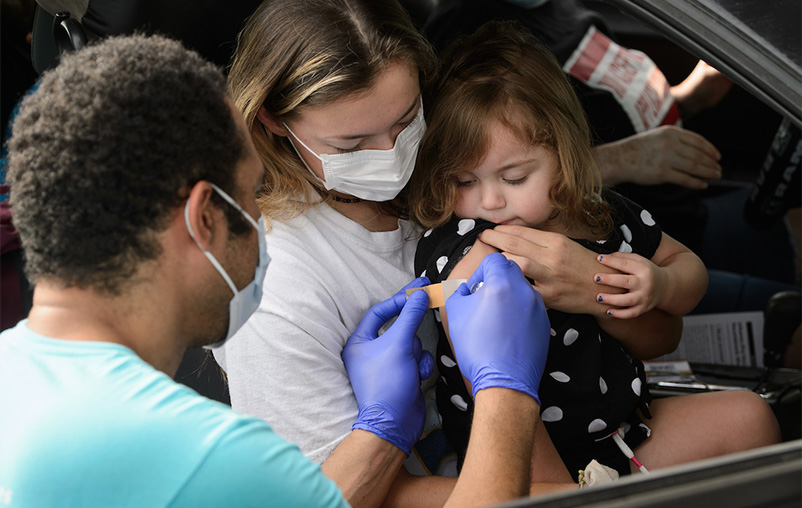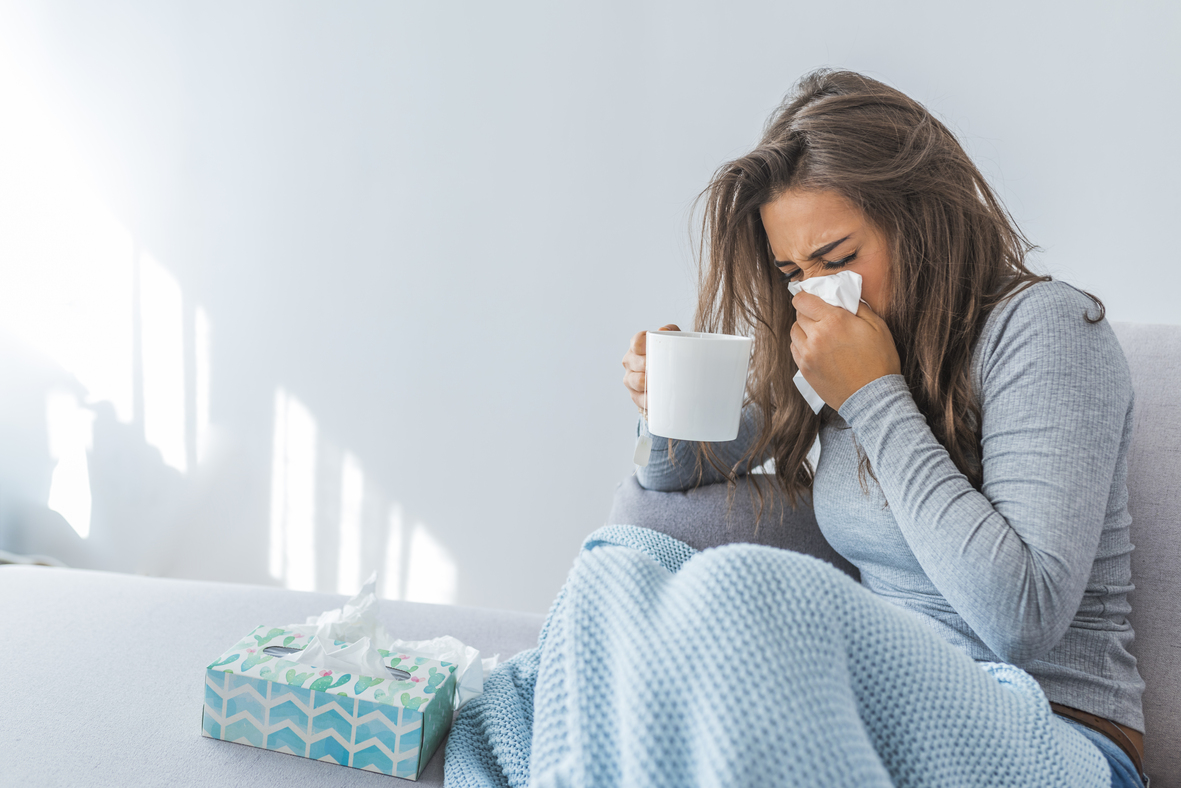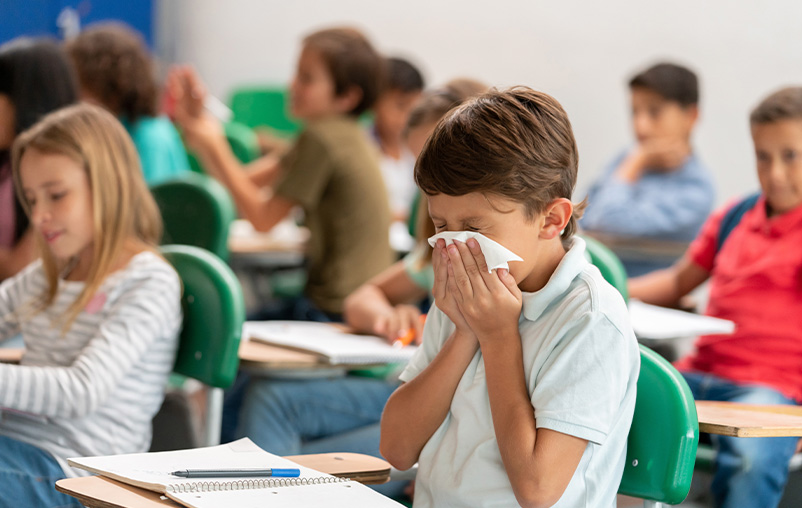With the COVID-19 pandemic becoming endemic and new CDC guidelines on masking, social distancing and quarantine, people are asking, “Is COVID still a thing?”
Dr. Jason Bowling talks about how to make the best decisions for your situation, what to expect with the new vaccines, and how important it is to keep getting all recommended booster shots.
Clarify new CDC guidelines on masking, social distancing and quarantining with COVID-19.
The CDC has come out with updated guidance this past week to get updated with what’s actually happening with COVID-19. We’re at a different place now from the start of the pandemic.
Most people in the United States have either been infected or have been vaccinated, and we’re in a different place as far as people have been previously exposed, less serious illness, less people ending up in the hospital. So they’re trying to find more practical ways for us to live with COVID similar to how we live with influenza and other respiratory viruses because we know we’re in this for the long haul. It’s become endemic.
With that, masking is still important, and they still emphasize masking as a tool to protect yourself from getting infected. If COVID transmission is high in your community or you have risk factors that put you at high risk for severe disease, you should really think about masking.
They have eliminated quarantine if you’re exposed. So if you’re in the community and you’re exposed to someone you find out has COVID, previously the CDC recommended that you quarantine yourself and monitor for signs of symptoms. Now they’re asking if you have a high-risk exposure to wear a mask for 10 days after that exposure, whether you’re vaccinated or not, and consider getting tested five days or longer after that exposure.
They’ve also eliminated social distancing, which is staying six feet or farther away. They recognize that people are back in circulation, there’s no lockdown in place, people are moving around in public places where it isn’t possible to keep six feet apart. If COVID transmission is high, they recommend you wear a well-fitting, high-quality mask to prevent yourself from getting infected as opposed to looking at the six-foot distancing.
Speaking of the flu, it wasn’t that bad the past two years. Should we be worried about it this year?
We haven’t seen high levels of flu the last couple of years, which has been good, and probably largely attributed to the public health interventions we’re doing to try and reduce the transmission of COVID-19. This includes wearing masks, avoiding large crowds, etc.
I don’t think people should be worried about influenza, but I think people should still get the flu vaccine and be aware of flu activity because flu is not gone. Information coming out just recently shows that Australia is having more influenza this year than they had in 2019, before the COVID pandemic.
We may see some rebound of influenza activity, which isn’t surprising given that over the past couple of years during the pandemic, fewer people have gotten the influenza vaccine. They’ve been getting their COVID vaccines but not as frequently getting their flu shots. There’s less flu in general, and that means there are more people who are susceptible. They haven’t had immunity from natural infection or the vaccine. So we have a little bit more susceptible population now, too.
There’s ample reason for flu to rebound and to potentially occur outside of the normal “flu season.” Normally we talk about flu season as October through April. Last year we saw some cases in August. It’s certainly possible that we may see flu pop up outside of the normal timeframe.
So what I recommend is to get the flu vaccine when it’s available and keep track of flu activity in your area. You can look at Metro Health, look at your local health department, look at CDC FluView.
If the CDC isn't as worried about COVID-19 now, should I take any precautions or can I relax?
The CDC isn’t telling people not to worry. What they want to do is leave it up to the individuals themselves. I would suggest you do your own risk calculation. If you have medical conditions and you’re not sure if you’re at risk for more severe COVID disease, you should talk to your primary care doctor and ask them about that.
Generally, people that are 65 and older or have chronic medical illnesses, especially underlying lung or heart disease, or if you’re immunocompromised, are at a higher risk for complications. You should be aware of where COVID is circulating and make decisions about when to wear a mask.
It’s important to also get the COVID vaccine and get the boosters as you’re eligible to do so. There should be a new booster coming soon, so keeping on top of that and making sure you’re up to date is the best way to have some insurance so you don’t have to worry. You can be aware without being as concerned.
If COVID-19 is less serious now, why should we worry?
It’s good news that we’re not seeing people as severely ill as we saw. We are still seeing some people end up in the hospital and the ICU — most of those people have underlying conditions that put them at higher risk.
But we are still seeing people end up with long COVID, and the majority of those people don’t end up in the hospital. So there’s still the potential for long term consequences for having COVID-19. There are still reasons why we recommend that people get the vaccine, wear a mask, take precautions when COVID transmission is high so they protect themselves.
We’re trying to find a balanced approach so people aren’t worried all the time because that’s not sustainable.
When might we expect to see an updated COVID-19 vaccine that is adapted for variants?
The updated COVID vaccine that people have been asking about, one that has an omicron variant-based strain in it, has actually been approved in the UK by Moderna.
Pfizer is also working on an updated vaccine. We want a vaccine with a strain in it that mirrors what's circulating in the population. Both the Moderna and Pfizer vaccines actually have two strains of SARS-CoV-2 virus (the virus that causes COVID-19) in them. One is the original virus that started this pandemic and that people have been getting in their COVID vaccines. The other is the omicron variant-based strain.
The good news is that what they’re seeing in lab studies is the updated omicron variant-based strain provides a really good immune response against the strains that are currently circulating — the BA.5 and the BA.4.
Should I get a second COVID-19 booster now or wait until the new vaccines come out in the fall?
It’s still recommended for people who are eligible — people over 50 or people that are immunocompromised — get that extra dose, the second booster.
It’s still not entirely clear when we’re going to have access to this updated omicron variant-based vaccine from Moderna and Pfizer. It’s hopeful it’ll be sometime in September or October but sometimes there can be manufacturing delays or supply chain issues. So it could be a little bit later.
If you’re eligible for that second booster, you should get it. Otherwise, hang tight. Hopefully this omicron variant-based vaccine will be available soon.
Will I be able to get the new COVID-19 vaccine in the fall if I get a booster now?
At this time, the CDC and the federal government really want people to get every booster that they’re eligible for, and they’re saying that they’re not going to prevent somebody that gets a booster now from getting that omicron variant-based booster when it becomes available. They want to have both, and ideally on some sort of schedule similar to what we have with the flu vaccine, where people are getting are getting it annually.
The Novavax vaccine is now available for adults not currently vaccinated against COVID-19. How does it measure up against the Pfizer and Moderna mRNA vaccines?
The Novavax vaccine is approved and provides a nice alternative for people who have concerns about the mRNA vaccine that both Moderna and Pfizer use, or they had a strong reaction to it and aren’t able to take it.
The Novavax vaccine is actually based on more traditional vaccine platform technology. It uses a subunit protein, which is just a protein of the SARS-CoV-2 virus that causes COVID-19, and a stimulant that makes your immune system react to that protein and develop antibodies to protect you. This is similar to other vaccines that people have received in the past.
The efficacy data, or how well it works, is actually quite good. And in the data that’s comparable to the Moderna and Pfizer, it was just a little bit less effective than Moderna and Pfizer. It’s about 90% effective, compared to 93% and 95%.
For people who’ve had problems with the mRNA vaccine, I’d encourage them to talk with their doctors and get the Novavax vaccine.





